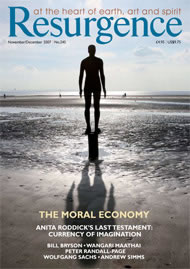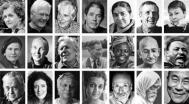TO ENCAPSULATE IN one volume the lives and ideas of 100 ‘movers and shakers’ of the 20th century and present them free of sound bite and superficiality is a remarkable achievement. This visually beautiful book, published by Green Books, has been compiled by Satish Kumar – himself a visionary – and Freddie Whitefield, and each
double-page article has been written by a regular contributor to Resurgence. The visionaries – categorised as ecological, social and spiritual – who have been chosen are men and women who have profoundly influenced the ethos of Resurgence and have kept alive the message of nonviolence, sustainability and hope during a war-torn century.
The range of thinkers and activists is hugely eclectic and diverse, embracing visionaries from both East and West and from Africa. Visionaries of the order of Gandhi and Martin Luther King are side by side with Bob Dylan and D. H. Lawrence. Ecological visionaries include Ted Hughes and Wangari Maathai, David Bohm and Vandana Shiva. What unite this diversity and bring the whole volume together into a coherent whole are the shared themes of systems thinking, sustainable living, small, human-scale communities, non-anthropocentrism, anti-consumerism and anti-globalisation. A holistic worldview is fundamental. As we read in the article by Noel Charlton on Gregory Bateson, the ‘systemic wisdom’ that enables human beings to live sustainably within the living community of Earth is the outcome of the total integration of thought.
Such a transformation in the way we think is tantamount to a paradigm shift and it is impossible to be a regular reader of Resurgence and not grasp that this is what the magazine consistently calls for. We have been talking about paradigm shifts for forty years, since Thomas Kuhn’s concept became known. But the current crisis in Western society cries out for new ways of thinking and of doing – in fact, for visionaries – now. Joseph Campbell, the radical US psychoanalyst who is one of this book’s social visionaries, is quoted as saying, “What all myths have to deal with is a transformation of consciousness. You have been thinking one way, now you have to think in a different way.”
But how can this come about? Campbell says, through “trials and revelations”. This may be so. The trials to the human condition that climate change and social collapse may bring during this century will necessarily force new ways of thinking and doing. More positively and more hopefully we need to turn to education. Not just ‘schooling’ but education in its widest sense of enabling everyone to live responsibly and co-operatively in the natural world.
Surprisingly, not one of the 100 men and women included in Visionaries is described as an educator – although it could be argued that all have education at the heart of their work in the sense of preserving the future of humanity – and the work of a visionary environmental educator such as David Orr is omitted. Where, however, education is referred to as, for example, in the ideas of Peter Kropotkin, Maurice Ash and Patrick Geddes, the message is that learning by doing, learning through Nature and learning with hand, heart and brain should be at the heart of all educational experience. The task of an educational visionary of today is to translate these ideas to meet the changed realities of the 21st
century.
The visionaries of the 21st century may have to grapple with a different set of ground rules – as has always been the case!








